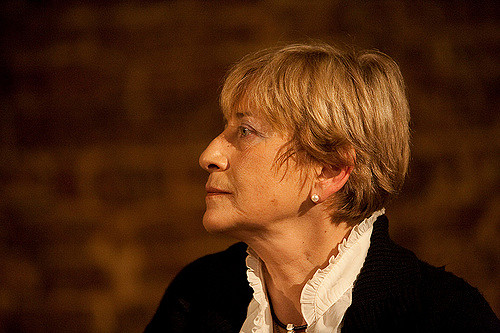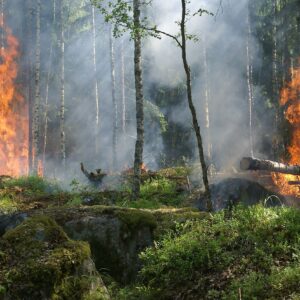We recently spoke with author Olga Sedakova about her new Slant book, Old Songs.
In his foreword to this translation, Rowan Williams says that you invite the reader to get “lost” in these poems—and that while we are lost we may become open to noticing something we hadn’t seen before. Does this description resonate with you?
What a profound and precise observation! It is the author, first and foremost, who “gets lost.” He (or she, in my case) is the one who must catch sight of something “we’ve never seen before.” Artists like to say that they write (or paint) something to preserve it, to “impress” it, to keep it from vanishing in the current of time. This kind of impulse is completely foreign to me. What I need is for something completely unknown to me to open up. To open itself up as in other poems of mine, such as “Elegy of Autumn Water”:
All things open like a door. Each thing has a secret doorway to the passage beyond heaven, underground. You come upon it, and the grateful heart runs in—and falls silent in its native land.
But it’s important to keep in mind that it’s not you opening this door: it opens itself before you. And here’s what is interesting: this thing that it seems you know nothing about opens itself to you as your own, as something deeply familiar. More familiar than everything you already know.
Now, that’s about the author. But Rowan Williams is talking about the reader. Not all readers are ready to accept an invitation of this nature. More than once I’ve heard from readers who react accordingly—that is, in a judgmental manner:
“I can’t understand this!”
“What can’t you understand?,” I’ll ask.
“I can’t understand what it’s about.”
This kind of reader wants to understand from the outset where we are and where we’re headed.
Old Songs draws on folk culture—ballads and other historical forms. What drew you to use these “pre-modern” forms?
There were two motives here. One general, another biographical.
I’ll begin with the more general one. I really love folk poetry, oral and anonymous, and Russian, and any other kind. What I love about it is something you rarely encounter in literary poetry: it holds so much more silence. Literary writing seems fussy in comparison with these words that are like stones tumbled around by the sea—by a sea of centuries-long memory. And I love, too, how its words bear a completely other state of being—shimmering, elusive. Like Mandelstam’s word—Psyche. But I also want what is firm, rounded, clear. And rhythm, by the way, is not the least of considerations. Our poetry experts have still not analyzed the rhythmics of folk poetry. Russian poetry of the nineteenth and twentieth centuries did not yet write in this kind of rhythm. In Pushkin you can find a similar rhythmic idea—in his Songs of the Western Slavs or his “Tale of the Fisherman and the Fish.” But in Old Songs the lines are shorter and lighter.
The model for Old Songs is a particular genre of oral folk poetry, “spiritual verses”—something along the lines of Russian spirituals. The favorite heroes of “spiritual verses” are Prince Jehoshaphat, Saint Alexius of Rome, Joseph the Splendid…. They make appearances in my verse. But here, in Old Songs, there are no quotes from folkloric texts, no stylization, no “folk” language. It’s more about a general tone, a rhythm.
And the biographical impulse comes from the songs I heard in childhood from my grandmother, Darya Semyonovna Sedakova. She didn’t so much sing as she “spoke” them—intoned them. This thought of her shaped the writing. And the thought of early childhood.
At one point you write that you love neither rich nor poor, neither this or that nation, but what is “glimpsed and accused” («что мнится и винится»). Without trying to explain a mystery, what might these words say to you now? What are things you love in the world now that are “glimpsed and accused”?
“A mysterious revelry”? Oh, it’s hard to say. It’s of course not so much specific objects as flashes, and they occur in different places. Especially, probably, amongst plants. Animals, too. And the tiniest things, like a grasshopper. It’s harder with people, I have to admit. But it happens there, too.
In one of your poems in Old Songs, you pray to be changed into a “cut gem” («камень отграненный»). Images of treasures from the deep, including precious stones, appear in other places in your writing, too. Can you reflect for us on what it means to you to be transformed into a “cut gem”?
I don’t like explicating my own images, and I can’t really do it. I’d like, instead, to direct attention to the place of this stone in the poem: the main word here is “something new”:
Make of me something new.
The stone here is just an example of something new. It’s clear that the main thing about the stone here is its play with light, which the faceting intensifies. But the most important thing is that it’s a precious stone—that no one will ever see! Now that is strange. Precious cut gems are meant to be admired, to be displayed. But here it’s lying God knows where:
Not inside and not outside…
From the perspective of the present, more than forty years after Old Songs was written, what strikes you most about this collection?
I wouldn’t want to change a single word in them. It’s like nothing I would write these days. I’m astonished at the outcome.
But here’s what Old Songs has gifted to me this past month. The poet and philosopher Andrey Rudenko, whom I have never met, has sent me translation after translation of these songs in Ukrainian! And they’re wonderful translations! With everything that’s going on right now, I never could have imagined that someone in Ukraine would at this moment undertake to read and translate Russian poetry. And this astonishing event is like a thoroughly unexpected ray of light in my current mood, a mood—due to this cruel and meaningless war that’s being carried out in the name of my country and my language—of horror and hopelessness.





